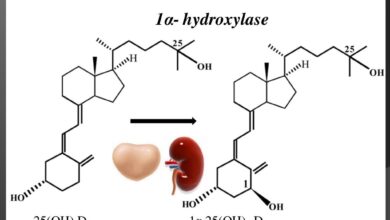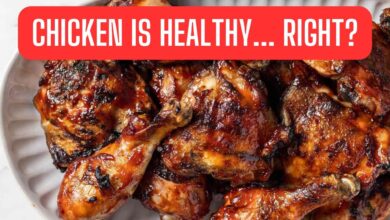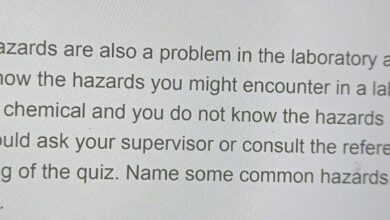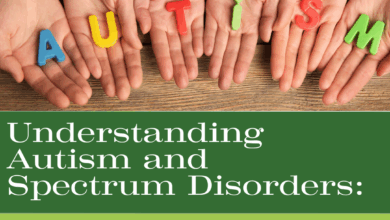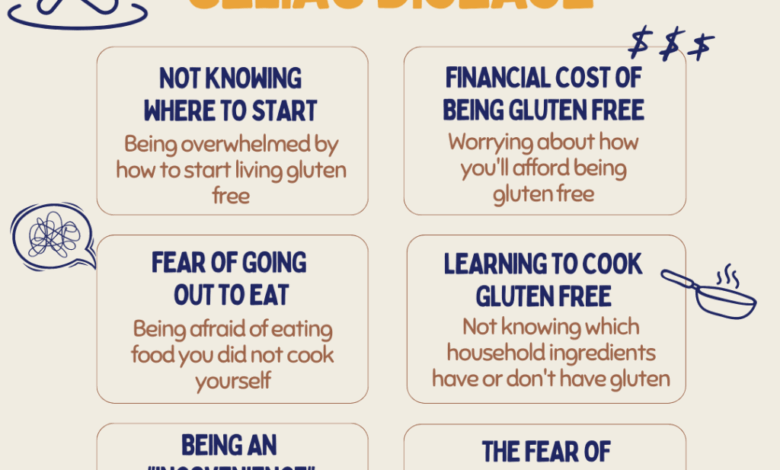
Celiac disease anxiety fear of food is a significant challenge for those living with this condition. It’s more than just dietary restrictions; it’s a complex interplay of psychological and emotional factors that deeply impact daily life. From the constant worry about hidden gluten to the fear of social judgment and exclusion, the anxieties surrounding food can be overwhelming.
This blog post dives deep into understanding the phenomenon, exploring the practical challenges, and providing coping mechanisms and support systems to help navigate this complex landscape.
The strict gluten-free diet required for celiac disease can create a constant state of vigilance and fear, often leading to anxiety and distress. We’ll explore common triggers, the impact on body image and self-esteem, and the difficulties encountered in social situations and eating out. Practical strategies for coping with these challenges, alongside resources and support systems, will also be discussed.
Understanding the Phenomenon
Living with celiac disease is more than just a dietary restriction; it’s a multifaceted experience that deeply impacts one’s psychological and emotional well-being. The constant vigilance required to navigate the gluten-free world can lead to significant anxieties and fears, shaping the individual’s relationship with food and their self-image. This aspect of the condition is often overlooked, but it’s crucial to acknowledge and understand the challenges it presents.The psychological and emotional toll of celiac disease stems from the constant need for vigilance and the fear of accidental exposure to gluten.
This constant awareness can be exhausting and create a significant source of stress. The chronic nature of the condition further compounds this, as it requires ongoing management and adaptation. Furthermore, the social and cultural implications of dietary restrictions can contribute to feelings of isolation, exclusion, and even discrimination.
Psychological and Emotional Aspects of Celiac Disease
Celiac disease significantly impacts an individual’s psychological and emotional state due to the demanding nature of a strict gluten-free diet. The constant need for meticulous food preparation and label reading, coupled with the fear of accidental contamination, can lead to feelings of stress, anxiety, and even depression. The social and cultural implications further complicate the emotional burden.
Common Anxieties and Fears Associated with a Gluten-Free Diet
The fear of accidental gluten exposure is a primary source of anxiety for individuals with celiac disease. This fear manifests in various ways, including heightened sensitivity to food labels, meticulous preparation of meals, and a constant worry about cross-contamination. The fear of social situations where food is involved can be particularly challenging, leading to feelings of isolation and exclusion.
Living with celiac disease can bring a lot of anxiety, especially the constant fear of food contamination. It’s a constant battle against the unknown, trying to navigate a world filled with hidden gluten. This fear of the unknown, like the beauty described by Arabelle Sicardi in her piece “Beauty is Terror and Power” arabelle sicardi beauty is terror and power , can feel overwhelming.
Ultimately, this relentless fear of food is something many with celiac disease struggle with daily.
Individuals may also experience anxiety about the limited choices available in restaurants and social gatherings.
Societal Pressures and Expectations Surrounding Food Choices
Societal expectations and pressures surrounding food choices can significantly impact individuals with celiac disease. The emphasis on shared meals, celebrations centered around food, and the social aspect of eating can create a sense of exclusion and isolation. Individuals may feel pressured to conform to social norms regarding food, leading to feelings of guilt or inadequacy. The expectation of effortless dietary adherence can be challenging for those with celiac disease, particularly in social settings.
Impact of Food Restrictions on Body Image and Self-Esteem
Strict dietary restrictions can significantly affect body image and self-esteem. The constant need for vigilance and the perceived limitations in food choices can lead to feelings of frustration and inadequacy. The focus on what one
Living with celiac disease can bring a lot of anxiety, especially the constant fear of accidentally eating something with gluten. Finding safe and healthy alternatives is crucial, and exploring options like fermented foods could be a game-changer. For example, can eating fermented foods help curb inflammation? can eating fermented foods help curb inflammation This could potentially ease some of the digestive discomfort and overall inflammation often associated with celiac disease, reducing the anxiety surrounding food choices.
Ultimately, finding ways to manage inflammation and anxiety related to celiac disease is a personal journey.
- can’t* eat, rather than what one
- can* eat, can negatively impact self-perception. In some cases, individuals may experience body image issues or develop eating disorders due to the emotional toll of strict dietary restrictions.
Common Triggers for Anxiety Related to Food
Numerous factors can trigger anxiety related to food for individuals with celiac disease. These include social gatherings, restaurant dining, attending parties, and even preparing meals at home. The fear of cross-contamination, the need for meticulous label reading, and the uncertainty surrounding hidden gluten in certain products can create significant anxiety. Unexpected encounters with unfamiliar foods or recipes can also be a source of worry.
The Impact on Daily Life
Living with celiac disease anxiety is more than just a dietary restriction; it significantly impacts daily life, creating unique challenges in social settings and personal well-being. The constant vigilance required to avoid gluten can be mentally taxing, leading to significant emotional and practical difficulties. This often extends beyond the kitchen, impacting social interactions and overall quality of life.Celiac disease anxiety isn’t just about the physical act of eating; it’s about the pervasive fear of contamination, the constant worry about accidental exposure, and the pressure to meticulously manage every aspect of one’s diet.
This heightened awareness can significantly impact daily routines, making seemingly simple tasks feel overwhelming.
Practical Challenges of Managing Celiac Disease Anxiety
Managing celiac disease anxiety requires a multifaceted approach that addresses both the physical and emotional aspects of the condition. Practical challenges range from meal preparation and grocery shopping to navigating social situations and maintaining emotional well-being. The need for constant vigilance can feel exhausting, making everyday tasks more difficult.
Difficulties in Social Situations and Eating Out
Dining out or attending social gatherings becomes a minefield for individuals with celiac disease anxiety. The fear of cross-contamination, the uncertainty of menu items, and the pressure to explain dietary restrictions can be emotionally draining. Finding restaurants with dedicated gluten-free options or communicating with hosts about dietary needs can be challenging.
Emotional Toll of Constant Monitoring of Food Intake
The constant monitoring of food intake, the meticulous checking of labels, and the fear of accidental exposure to gluten can take a significant emotional toll. This vigilance can lead to feelings of isolation, anxiety, and even depression. The fear of making a mistake can create a cycle of self-doubt and stress. The pressure to be perfect can lead to feelings of inadequacy.
Practical Strategies for Coping with These Challenges
Effective coping strategies are crucial for managing celiac disease anxiety and improving quality of life. A combination of mindful strategies, practical techniques, and social support can significantly ease the burden.
- Developing a robust support network is essential. Sharing experiences with others who understand the challenges can provide invaluable emotional support and practical advice. Joining support groups or online communities can foster a sense of connection and belonging.
- Educating oneself about celiac disease and gluten-free living is paramount. Understanding the condition, including potential cross-contamination risks, helps individuals make informed decisions and navigate challenges more effectively. Knowledge empowers individuals to confidently manage their condition.
- Practicing mindfulness and stress-reduction techniques can help manage anxiety and stress associated with celiac disease. Techniques like deep breathing exercises, meditation, or yoga can help individuals cope with the emotional toll of the condition. Mindfulness practices can help to reduce the constant worry.
- Developing practical meal planning strategies for managing daily meals can significantly reduce anxiety. Creating a detailed meal plan, including potential meal replacements, or planning ahead can lessen the burden of daily meal preparation and reduce anxiety.
- Communicating openly and honestly with friends, family, and partners about dietary needs and concerns can prevent misunderstandings and facilitate support. Honest communication can foster understanding and cooperation.
Strategies for Navigating Social Situations with Food Anxiety
Social situations involving food can be particularly challenging for individuals with celiac disease anxiety. Developing effective strategies for navigating these situations is crucial for maintaining social connections and overall well-being.
- Preparation and planning are essential for managing anxiety in social situations. Having a plan for meal choices, dietary accommodations, and communication strategies can reduce stress and promote confidence.
- Assertive communication with restaurant staff, hosts, or friends about dietary restrictions is vital. Clear and concise communication can help avoid misunderstandings and ensure that dietary needs are met.
- Seeking support from others who are knowledgeable about celiac disease can alleviate anxiety and enhance the experience of social gatherings.
- Learning to say no to situations that feel overwhelming or unsafe can be crucial. Prioritizing personal well-being and setting healthy boundaries can prevent situations that might exacerbate anxiety.
- Focusing on shared experiences that do not involve food can help shift the focus from dietary concerns and build social connections. Sharing interests, activities, or experiences that do not revolve around food can create positive social interactions.
Coping Mechanisms and Support Systems: Celiac Disease Anxiety Fear Of Food

Navigating celiac disease can be challenging, and the anxiety surrounding food choices can significantly impact daily life. This section explores various coping mechanisms and support systems designed to help individuals manage these anxieties effectively. Developing healthy strategies and connecting with others facing similar experiences can make a real difference in the overall well-being of those with celiac disease.Celiac disease anxiety often stems from the fear of accidentally consuming gluten and the potential health consequences.
Effective coping mechanisms empower individuals to regain control and navigate the complexities of their dietary needs with confidence. Recognizing the triggers, developing strategies to manage stress, and connecting with a supportive community are crucial steps in mitigating the anxiety and improving quality of life.
Coping Strategies for Managing Food Anxiety
Understanding and implementing various coping mechanisms can significantly ease the burden of food anxiety. These strategies address different aspects of the experience, from managing emotional responses to practical dietary planning. Implementing a combination of strategies often yields the best results.
- Mindfulness Meditation: This practice helps individuals become more aware of their thoughts and feelings without judgment. By focusing on the present moment, individuals can reduce the tendency to ruminate on anxieties about food. Regular practice can cultivate a sense of calm and acceptance, reducing the intensity of fear responses. This can be particularly helpful in managing stress associated with meal planning and social situations involving food.
- Cognitive Behavioral Therapy (CBT): CBT is a widely recognized therapeutic approach that helps individuals identify and challenge negative thoughts and behaviors. By understanding the connection between thoughts, feelings, and behaviors, individuals can develop healthier coping mechanisms for managing food anxiety related to celiac disease. CBT can help people develop realistic expectations about their diet and improve their ability to manage the stress associated with food choices.
- Support Groups: Connecting with others who understand the challenges of living with celiac disease and food anxiety can provide invaluable emotional support. Support groups offer a safe space to share experiences, receive encouragement, and learn coping strategies from others. Finding a supportive community can reduce feelings of isolation and provide a sense of belonging.
- Healthy Diet: A well-planned and nutrient-rich diet is crucial for overall well-being, and it can also help to reduce anxiety related to dietary restrictions. By focusing on wholesome foods and understanding the nutritional needs of celiac disease, individuals can feel empowered and confident in their dietary choices. This approach promotes a sense of control and reduces the fear associated with food.
Available Resources
Numerous resources can provide support and guidance for individuals navigating celiac disease and related anxieties. Utilizing these resources can help individuals feel empowered and supported in their journey.
- Online Support Groups: Online forums and groups offer a readily accessible platform for connecting with others experiencing similar challenges. These groups can provide a space for sharing experiences, advice, and emotional support. Examples include Facebook groups and dedicated online communities.
- Celiac Disease Organizations: Organizations dedicated to celiac disease often provide valuable resources, including information about the disease, support groups, and educational materials. These resources can be crucial for understanding the condition and navigating its challenges.
- Mental Health Professionals: Therapists and counselors specializing in anxiety disorders can provide personalized support and guidance. They can help individuals develop coping mechanisms and strategies for managing their specific anxieties related to celiac disease.
Effectiveness and Drawbacks of Coping Strategies
This table Artikels different coping strategies for managing celiac disease-related food anxiety, their effectiveness, potential drawbacks, and notes for consideration.
| Coping Strategy | Effectiveness | Drawbacks | Notes |
|---|---|---|---|
| Mindfulness Meditation | High | Can be time-consuming | Practice regularly for optimal results. |
| Cognitive Behavioral Therapy (CBT) | High | Requires commitment and time investment. | Learn to identify and challenge negative thoughts. |
| Support Groups | Moderate | Finding a suitable group that resonates with individual needs. | Connect with others facing similar challenges. |
| Healthy Diet | High | Requires planning and preparation | Focus on nutrient-rich food, emphasizing balanced meals. |
Addressing Specific Fears
Living with celiac disease often brings a unique set of anxieties, and understanding these fears is crucial for effective management. These fears can significantly impact daily life, affecting choices about food, social situations, and overall well-being. Recognizing and addressing these concerns is a vital part of navigating this condition.The anxieties surrounding celiac disease are not just about avoiding gluten; they are multifaceted, encompassing a range of potential challenges.
This section delves into the specific fears that individuals with celiac disease commonly experience, highlighting their nature and providing insights into how to cope with them.
Common Fears about Cross-Contamination
Cross-contamination is a significant concern for individuals with celiac disease. The fear arises from the possibility of gluten-containing foods coming into contact with gluten-free foods, rendering the latter unsafe for consumption. This can occur in various settings, including restaurants, homes, and even workplaces.
- Restaurant dining presents a particular challenge. The shared preparation areas and utensils can easily lead to cross-contamination, and the lack of complete gluten-free options can exacerbate anxiety. For example, a restaurant may use the same cutting board for both gluten-containing and gluten-free foods, potentially jeopardizing the safety of a gluten-free meal.
- Home kitchens, despite best efforts, can become sources of cross-contamination. Shared utensils, cutting boards, and even the air around food preparation can lead to accidental gluten transfer. The fear is that a seemingly harmless act can result in a severe reaction.
- Shared food preparation spaces, such as community kitchens or workplaces, amplify the risk. Lack of clear separation between gluten-containing and gluten-free items can lead to unintentional contamination.
Fear of Accidental Gluten Intake
The fear of accidental gluten intake is deeply rooted in the potential for severe health consequences. Even minuscule amounts of gluten can trigger symptoms in individuals with celiac disease.
- The fear of accidental exposure is pervasive. It encompasses various situations, from consuming unknowingly contaminated foods to unknowingly consuming gluten-containing ingredients.
- Reading labels meticulously is often a necessary but time-consuming task. The sheer volume of packaged goods and the potential for hidden gluten can cause a great deal of stress.
- This fear is further intensified by the unpredictable nature of celiac disease symptoms, which can range from mild discomfort to severe reactions. The uncertainty about how much gluten will trigger a reaction adds to the anxiety.
Fear of Social Judgment and Exclusion
Celiac disease can significantly impact social interactions. The need to avoid gluten-containing foods can lead to feelings of isolation and exclusion, especially when dining with others.
- Dining out becomes a complex and often stressful event. Finding suitable gluten-free options and ensuring safety can be challenging, leading to feelings of being excluded or treated differently.
- Social gatherings often involve shared food, and the need to navigate these situations without triggering symptoms can be anxiety-provoking.
- The fear of judgment from others about dietary choices can also contribute to feelings of social isolation.
Fear of Not Finding Suitable Food Options
Finding safe and satisfying gluten-free options can be challenging. The limited availability of gluten-free foods in restaurants and grocery stores can create anxiety and frustration.
- The availability of gluten-free options can vary significantly, creating anxiety about meal planning.
- Restaurant choices become more limited, forcing individuals to carefully consider menus, potential cross-contamination, and restaurant preparation methods.
- The need to carefully plan meals and ensure access to safe food sources can be a considerable burden.
Fear of Developing Nutrient Deficiencies
Following a strict gluten-free diet can sometimes lead to concerns about nutrient deficiencies. The fear is that careful meal planning is not enough to ensure all necessary nutrients are obtained.
- Ensuring sufficient intake of vitamins, minerals, and other essential nutrients can be a constant concern.
- Strict adherence to the gluten-free diet may lead to nutrient deficiencies if not carefully planned and supplemented.
- The need for careful monitoring of dietary intake and potential supplementation is important.
Fear of Long-Term Health Consequences
Long-term health consequences associated with celiac disease, if not properly managed, can further amplify the anxiety.
- The fear of developing long-term complications from celiac disease, such as malnutrition, osteoporosis, or other health issues, can be very distressing.
- The fear is further amplified by the potential for increased risk of certain conditions, like anemia or weakened bones.
- Proper management and monitoring of the condition is critical for mitigating long-term health concerns.
Strategies for Food Management
Navigating a gluten-free life requires meticulous planning and execution. It’s not just about avoiding gluten; it’s about building a sustainable and enjoyable approach to food. This involves understanding the nuances of food labels, preparing meals strategically, and confidently navigating social situations. This section provides practical strategies for effective food management.
Meal Preparation and Planning
Effective meal planning is crucial for maintaining a balanced gluten-free diet. A well-structured plan helps minimize stress and ensures you consistently meet your nutritional needs. A detailed meal plan, including breakfast, lunch, dinner, and snacks, is beneficial. It provides a roadmap for the week, allowing you to anticipate and prepare for potential challenges. Shopping lists derived from the meal plan further streamline the process, preventing impulse purchases of unnecessary ingredients.
Having a clear plan for grocery shopping and meal preparation reduces stress and ensures that you have readily available gluten-free options.
Restaurant Navigation
Dining out can be challenging for individuals with celiac disease. Communication with restaurant staff is key. Communicating clearly about your dietary restrictions, and requesting a gluten-free menu or asking about potential cross-contamination concerns is essential. Be prepared to explain your needs to waitstaff, kitchen staff, and other restaurant personnel. If a gluten-free option is not available, having a backup plan, such as ordering a dish with minimal ingredients or choosing a restaurant known for accommodating dietary restrictions, is crucial.
Safe and Appropriate Foods, Celiac disease anxiety fear of food
This list highlights gluten-free alternatives, while emphasizing the importance of a balanced diet. Note that this is not an exhaustive list, and consulting a registered dietitian is highly recommended for personalized dietary guidance.
- Fruits and vegetables: A wide array of fruits and vegetables are naturally gluten-free. These provide essential vitamins, minerals, and fiber.
- Lean proteins: Chicken, fish, turkey, eggs, beans, and lentils are excellent gluten-free protein sources.
- Gluten-free grains: Rice, quinoa, buckwheat, and corn are examples of gluten-free grains that can be used in place of wheat-based products.
- Dairy products: Milk, cheese, and yogurt are generally gluten-free, though it’s crucial to ensure products are labeled as such.
- Legumes: Lentils, chickpeas, and beans are excellent sources of fiber and protein.
Reading Food Labels and Identifying Hidden Gluten
Carefully reading food labels is critical. Look beyond the primary ingredients and examine the list of ingredients carefully. Many processed foods contain hidden gluten in unexpected places, such as sauces, seasonings, and additives. Common sources of hidden gluten include malt, barley, wheat starch, and hydrolyzed vegetable protein. Look for the phrases “may contain” or “processed in a facility that also processes” gluten-containing ingredients, which are crucial indicators of potential cross-contamination.
Gluten-Free Substitutes and Nutritional Value
Gluten-free substitutes offer alternatives to traditional wheat-based products, but their nutritional profiles can vary significantly. It’s crucial to compare nutritional information to ensure that the gluten-free alternative provides comparable nutritional value. For example, gluten-free pasta made from rice or quinoa may have a different texture and nutritional content compared to wheat pasta. Similarly, gluten-free bread made from rice flour may have a different nutritional profile than wheat bread.
Consider the overall nutritional balance of your diet when selecting gluten-free alternatives.
Importance of a Balanced Diet
A balanced gluten-free diet is essential for overall health. It should include a variety of fruits, vegetables, lean proteins, whole grains, and healthy fats. A balanced diet provides the necessary vitamins, minerals, and nutrients to maintain optimal health. A dietitian can help you develop a personalized plan to ensure your dietary needs are met. Remember that a balanced diet is crucial to maintain energy levels, and to prevent nutrient deficiencies that can result from an unbalanced diet.
Illustrative Examples
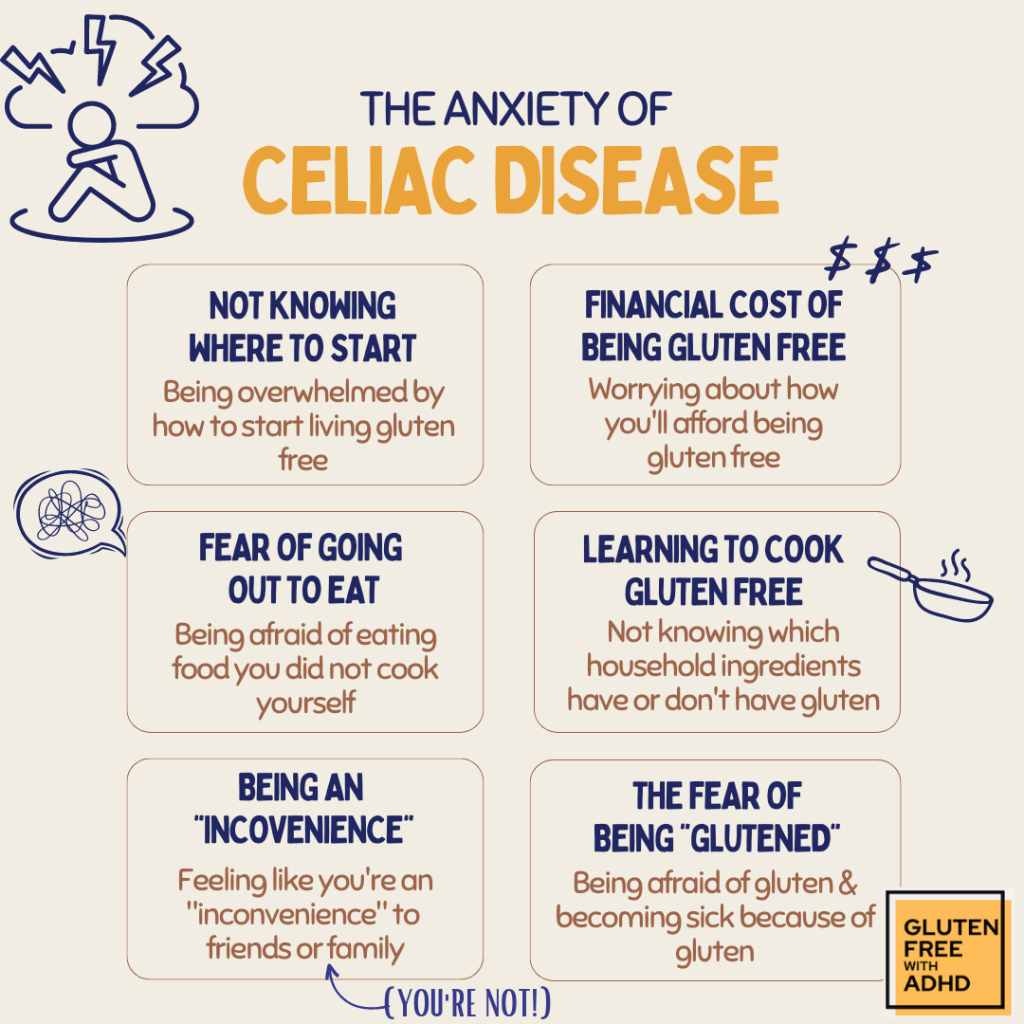
Living with celiac disease and anxiety can be a daily challenge. It’s not just about avoiding gluten; it’s about navigating social situations, managing expectations, and overcoming the constant fear of accidentally consuming contaminated food. These examples aim to illustrate the realities of this experience.
A Short Story of Managing Celiac Disease Anxiety
Sarah, a young professional with celiac disease, felt a knot in her stomach every time she went out to eat. The fear of cross-contamination, the pressure of making sure every dish was safe, and the constant worry about accidentally eating gluten dominated her thoughts. One evening, she was invited to a friend’s birthday dinner at a trendy restaurant.
Despite her anxiety, she decided to go, knowing it was important to her to maintain friendships. She meticulously reviewed the menu, calling the restaurant to confirm the preparation of each dish and ensure no gluten-containing ingredients were used. She also carried a small, portable gluten-free meal, just in case. Sarah’s meticulous planning, though time-consuming, allowed her to enjoy the evening without the overwhelming fear of an adverse reaction.
A Typical Day for Someone with Celiac Disease and Anxiety
A typical day for someone with celiac disease and anxiety often involves a meticulous preparation of meals and snacks, checking ingredient lists meticulously, and anticipating potential risks. Breakfast might involve a homemade gluten-free oatmeal, followed by a lunch meticulously planned to avoid any possibility of cross-contamination. Social situations require careful consideration, and the day can be fraught with moments of intense anxiety.
- Morning: Waking up with a sense of dread at the thought of the day ahead, meticulously checking labels and recipes.
- Lunch: A meticulous preparation of a gluten-free lunch to avoid cross-contamination, followed by a review of the menu at the workplace, or taking a gluten-free meal in advance.
- Afternoon: Increased anxiety as the day progresses and social situations are anticipated, or are already taking place.
- Evening: Worrying about dinner plans, and the need for meticulous research on the safety of each dish.
Eating Out with Celiac Disease and Anxiety
Dining out with celiac disease and anxiety presents a unique set of challenges. Careful planning is crucial.
- Research: Thorough research of the restaurant’s menu, ingredients, and preparation methods. Checking if they have gluten-free options and confirming preparation techniques to avoid cross-contamination.
- Communication: Communicating clearly with the waiter or chef about the need for a gluten-free meal and any potential cross-contamination concerns.
- Observation: Observing the restaurant’s practices for handling gluten-free meals and ensuring there are no obvious sources of cross-contamination.
Handling Unexpected Cross-Contamination
Unexpected cross-contamination can trigger intense anxiety. Having a plan for such situations is essential.
Living with celiac disease brings a unique set of anxieties, especially the constant fear of accidentally consuming gluten. It’s a constant worry, like a ticking clock, and it can be incredibly overwhelming. It took a pandemic for me to finally admit I have anxiety – why that’s a good thing, as you can read in this insightful piece it took a pandemic for me to finally admit I have anxiety why that’s a good thing.
This newfound awareness has actually helped me better manage the anxiety surrounding food choices and the daily struggles of navigating a celiac-friendly life.
- Preparation: Having a backup plan or a portable gluten-free meal for unexpected situations is crucial.
- Communication: Communicating calmly with the restaurant staff or the host in case of contamination concerns is essential.
- Safety: Prioritizing immediate safety and well-being is essential in the event of an immediate reaction.
Avoiding Social Situations Due to Food Anxiety
Social anxiety stemming from celiac disease and food fears can lead to avoidance of social situations.
- Isolation: The constant fear of social situations and cross-contamination can result in isolation and avoidance.
- Fear: The fear of being judged, ridiculed, or criticized for needing gluten-free food can lead to isolation and avoidance.
- Uncertainty: The uncertainty of navigating social situations and food choices, and the lack of support can lead to isolation and avoidance.
Coping Mechanisms During Social Events
Coping mechanisms can help manage anxiety during social events.
- Deep Breathing: Practicing deep breathing exercises to calm the mind and body.
- Positive Affirmations: Repeating positive affirmations to counteract negative thoughts.
- Support System: Enlisting the support of friends or family who understand the situation.
Educational Resources
Navigating the complexities of celiac disease anxiety requires access to reliable information and supportive resources. This section provides a structured approach to learning more about the condition and developing coping strategies. Understanding the available resources empowers individuals to actively manage their anxiety and improve their overall well-being.
Educational Materials for Managing Celiac Disease Anxiety
Educational materials play a crucial role in fostering a deeper understanding of celiac disease and its associated anxieties. These resources offer practical advice and support for effectively managing the challenges of the condition. They empower individuals to take an active role in their health and well-being.
Accessing accurate and reliable information is essential for managing anxiety related to celiac disease.
- Books and articles from reputable organizations offer insights into the condition’s impact on daily life, coping strategies, and support systems.
- Online platforms and forums dedicated to celiac disease provide valuable peer support and information-sharing opportunities.
- Educational workshops and seminars can offer practical tools and techniques for managing anxiety related to food choices and social situations.
Seeking Professional Guidance
Professional guidance is vital in addressing celiac disease anxiety. Mental health professionals, such as therapists or counselors, can offer tailored support and strategies to help individuals navigate the challenges associated with the condition. They can provide coping mechanisms and techniques for managing stress and anxiety.
Seeking professional help is a proactive step in managing celiac disease anxiety.
- Therapists can help individuals develop coping mechanisms for managing anxiety related to food avoidance and social situations.
- Cognitive Behavioral Therapy (CBT) techniques can help identify and modify negative thought patterns and behaviors contributing to anxiety.
- Support groups facilitate peer-to-peer sharing and understanding of common experiences.
Reputable Organizations Offering Support
Reputable organizations dedicated to celiac disease provide valuable support and resources. They offer a network of individuals and professionals who understand the unique challenges faced by those living with the condition. These organizations offer guidance, support, and educational materials to enhance overall well-being.
Reputable organizations offer a wealth of resources and support for individuals living with celiac disease.
- National organizations focused on celiac disease provide comprehensive information, support groups, and educational materials.
- Local support groups connect individuals with others who share similar experiences and offer emotional support.
- Online communities dedicated to celiac disease offer a platform for connecting with others, sharing experiences, and receiving support.
The Role of Nutritionists in Managing Celiac Disease Anxiety
Nutritionists play a crucial role in managing celiac disease anxiety by providing tailored dietary guidance. They can help individuals develop a safe and balanced diet that meets their nutritional needs while addressing their specific concerns. This can alleviate anxiety related to food choices and dietary restrictions.
Nutritionists provide personalized guidance and support in managing dietary needs and anxieties associated with celiac disease.
- Nutritionists can help individuals create a personalized meal plan that meets their nutritional needs while adhering to the gluten-free diet.
- They can educate individuals on food labeling and ingredient identification to help avoid unintentional gluten exposure.
- Nutritionists can address any concerns about nutritional deficiencies or deficiencies that may arise from strict dietary restrictions.
Closing Summary
In conclusion, celiac disease anxiety fear of food is a multifaceted issue requiring a holistic approach. By understanding the psychological and emotional aspects, recognizing the practical challenges, and employing effective coping mechanisms, individuals can better manage their anxieties and live fulfilling lives. This blog post offers insights into navigating the complexities of celiac disease, fostering a supportive environment, and promoting overall well-being.
